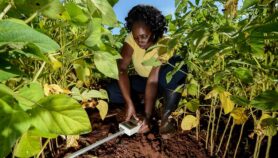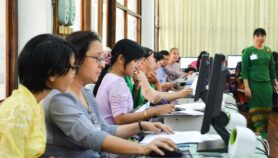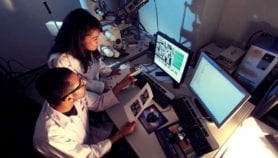By: Katie Mantell
Send to a friend
The details you provide on this page will not be used to send unsolicited email, and will not be sold to a 3rd party. See privacy policy.
Scientists in a growing number of developing countries are being offered reduced-price access to the electronic version of key scientific and medical journals, following negotiations with the journals’ publishers.
More than 5000 online scientific journals and databases have recently become available free of charge to researchers, students, librarians and medical professionals in Ghana, Kenya, Malawi, Mozambique, Tanzania, Uganda and Zambia, following the signing of country-wide licences.
The arrangement, which has been co-ordinated by the International Network for the Availability of Scientific Publications (INASP), based in Oxford, UK, comes in response to increasing concern that scientists in poorer nations are unable to afford access to scientific information, even though the marginal costs of providing this information to them electronically is relatively low.
INASP negotiated the offers — one component of its Programme for the Enhancement of Research Information (PERI) — in close collaboration with research partners. Publishers involved so far include Academic Press, Blackwell Science, Blackwell Publishers, EBSCO Publishing, Mary Ann Liebert and Munksgaard.
The programme also provides access to databases from SilverPlatter, a company producing database collections of scholarly reference information in electronic form, and the delivery of physical or electronic copies of documents through the British Library.
Access to these journals in the countries involved in PERI is free to users, as countrywide access has been paid for, either by PERI — with funding from the Danish Agency for Development Assistance (Danida) and the Swedish International Development Co-operation (Sida/SAREC) — or by the institutions themselves, taking up the negotiations made through PERI.
Plans have already been developed to extend and enhance the programme in a wider range of countries in Africa, Asia, Central America and the Newly Independent States of the former Soviet Union from 1 December 2001.
In the past, publishers have tended to price journal subscriptions — both electronic and print — uniformly, irrespective of their geographical location. Annual subscriptions cost on average several hundred, and sometimes several thousand, dollars per title. This has made it almost impossible for many health and research institutions in poorer countries to get electronic access to important scientific information, even where this electronic access can be provided by the publisher at a relatively low cost.
There has been an “enormous” response to the round of offers being made under PERI, says INASP director Carol Priestley. She adds that INASP hopes that the programme will make an “invaluable contribution” to strengthening the vital role that scientific and scholarly information plays in development.
Graham Wilson, of the University of Dar es Salaam, Tanzania, describes the project as “tremendous”, and one “which will give unprecedented help to university folk here”.
Special prices for access to online journals are also available to developing countries that are not yet involved directly in PERI. Academic Press, for example, is offering reduced-price licences for IDEAL, an Internet-based resource library for scientific and medical researchers.
The Academic Press offer, known as the IDEAL Charter for Low-Income Countries, involves nationwide licences. This means that once a licence is purchased in a country, any eligible institution there can access the full text of all journals in the IDEAL online library — including 143 journals from Harcourt Health Sciences and 177 from Academic Press — without paying extra.
The IDEAL Charter is available to researchers working in any country in sub-Saharan Africa, Asia and Central America in which the gross domestic product per capita is US$760 or less, the figure used by the World Bank to define “low-income” countries. Senegal has already taken up the offer and half a dozen other African nations are preparing to follow suit.
Many researchers have warmly welcomed the offer by Academic Press. “The need for current, accessible medical information has never been greater in certain African countries,” says Bruce Dahlman, of the Faculty of Health Sciences at Moi University in Eldoret, Kenya. “Greater electronic access to scientific findings could indeed transform how we teach and practice medicine in nations facing the most dire need.”
More offers are in the pipeline. The World Health Organisation (WHO) is spearheading an initiative to enable close to 100 of the world’s poorest countries to gain access to almost 1000 of the top biomedical journals they otherwise could not afford.
The six biggest medical journal publishers — Blackwell, Elsevier Science, the Harcourt Worldwide STM Group, Wolters Kluwer International Health & Science, Springer Verlag and John Wiley — signed a letter of intent in July 2001 to offer electronic access to their journals for free or at greatly reduced rates to researchers in these countries.
The project — due to begin in January 2002 — has been described by Dr Gro Harlem Brundtland, Director-General of WHO, as “perhaps the biggest step ever taken towards reducing the health information gap between rich and poor countries.”
The initiative will form part of the Health InterNetwork launched in 2000 by the UN Secretary-General Kofi Annan. Computer training as well as information and communication technology will also be provided in the project.
© SciDev.Net 2001













